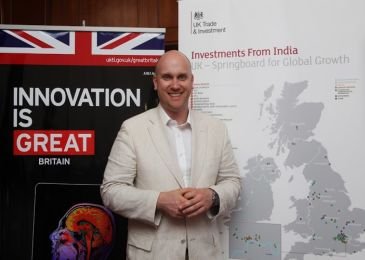India can serve as an academic base for the UK healthcare system: Dr Hill
September 18, 2013 | Wednesday | Interviews | By Rahul Koul Koul
India can serve as an academic base for the UK healthcare system: Dr Hill
Dr Adam M Hill, Sector Specialist, Healthcare and Medical Technology at the UK Trade & Investment (UKTI) Life Science Investment Organization (LSIO)
Dr Hill is an experienced academic clinician-scientist, having previously founded and led a successful research center at Imperial College London. He is both a qualified surgeon, with Membership of the Royal College of Surgeons of England, and a qualified mechanical engineer, and his area of expertise is in the research and development of medical technologies.
With over 90 peer reviewed publications, Dr Hill has been recognized with eight awards by the academic community in the last 10 years. He has also co-founded and held technical and commercial leadership positions at three start-up companies spanning social care service delivery, medical skills development and most recently, medical technology incubation.
In addition, Dr Hill has provided thought-leadership and content to a handful of government programs, including most recently, as a healthcare and medical technology sector specialist of the UKTI LSIO.
Here are the excerpts from the interview.
What are the major tenets of the UK Government's life science policy?
Dr Adam Hill: One of the most important challenges is to put the human clinical disease studies at the center of medical discovery, where they have always belonged. The focus is on development of an infrastructure which connects academics, industry, investors, clinicians and crucially the NHS. If we can become better at recognizing and rewarding innovation and ensure that good ideas don't get lost, and adopt them more quickly and efficiently across the NHS, then we can deliver better patient outcomes.
The life sciences industry in the UK, comprising the pharmaceuticals, medical biotechnology and medical technology sectors together has around 4,500 firms, employing 165,000 staff, with an R&D spend of nearly £5 billion and an annual turnover of over £50 billion. And the vision for life sciences in the UK is to become the global hub for life sciences in the future, providing an unrivaled ecosystem that brings together business, researchers, clinicians and patients to translate discovery into clinical use for medical innovation within the NHS.
Hence, the focus is on increasing productivity. This is visible in a number of areas including opening up of access to the National Health Research database for industry; creation of industry focused UKTI LSIO; and making of regulatory systems better so that the Medicines and Healthcare Products Regulatory Agency (MHRA) is adaptable in its approach. The National Institute for Biological Standards and Control has become part of the MHRA to reinforce UK's capabilities in regulating new generations of biological products too.
What are some of the opportunities for Indian companies in the UK?
There are wide opportunities for Indian companies. All Western healthcare systems are struggling with rising costs. Healthcare system companies think that technology might be the answer to reduce these costs. India now has become a hub for engineering. There is an interest from the Western healthcare systems in this type of technology that is happening here in India. What is critical is that it has to be tackled to cater to our needs.
India can serve as an academic base for the UK healthcare system. There is special interest in accessing those rare diseases that are of particular interest. There is a move in the US and the UK to start a global health initiative. As for India, it is very clear that the Western health care technology and innovation can truly support its healthcare system.
What are the key trends that you have been observing in the medical devices sector?
The borders of industries are no longer confined. It is open to everyone. We have started to see that the Information and Communications Technology (ICT) sector is showing keen interest in heath and healthcare systems. And there are other industries who are equally interested in it as well.
How can India and the UK collaborate in the medical technology space and strengthen commercial interests?
First, we need to recognize our strengths and look to collaborate over those individual strengths. There are patient populations in India that we would be interested in getting access to, and we can also share concrete knowledge about diseases that exist in the Indian sub-continent more than in any other country. We scale companies as it is done in the US. We can work on regulatory issues to increase the credibility of the life science industry. We want to largely focus on sharing academics and knowledge between India and the UK.
What are the major collaborative opportunities that exist between the UK and other Asian countries?
Most collaborative opportunities are supported through the Wellcome Trust. There are many other schemes available. The organization supports various activities and research in diseases such as Malaria and TB, and technology is one of the areas they are very interested in.
Are there any special initiatives that have been started between the UK and countries like China, Singapore, South Korea and Japan?
From the perspective of UKTI, the center of everything we do is in the public healthcare system. We are strategic about businesses and we do it when there is a reason to do so. We look where opportunities exist and where we may want to fill existing gaps. The UKTI LSIO team in India is here to help business' in India navigate the opportunity to partner with and invest in the UK, and to provide wider connections to the UK life science community.









